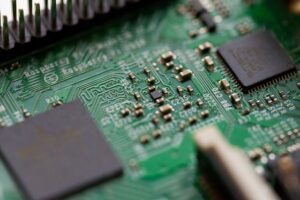Electronics & Communications
The department of Electronics and Communication Engineering (ECE) is the Government Aided Department and was established during the inception of the institute in 1983 with an annual intake of 60 students & was duly approved by the AICTE.
To provide valuable human resource for industry and society through excellence in the field of Electronics and Communication Engineering.
M1: To prepare engineering graduates with a sound educational background and specialized problem solving skills to undertake real life problems.
M2: To endeavour the students to become entrepreneurs and employable through adequate industry institute interaction.
M3: To prepare the graduates for higher education through self learning and to improve their technical and intellectual capabilities for life-long learning process.
M4: ToCommunicate and function effectively, both individually and multidisciplinary teams with professional ethics, social awareness and environmental concern.
PEO 1: Graduates shall demonstrate professionalism, entrepreneurship, ethical behavior, communication skills and collaborative team work and adapt themselves in their career.
PEO2: Students shall have skills and knowledge to work on analog and digital systems, adhoc and sensor networks, embedded and communication systems
PEO 3: Graduates of the programme will develop their potential by fostering intellectual curiosity towards pursuing higher studies through exposure to the modern engineering tools and techno innovative projects.
NBA has defined the following seven POs for an Engineering diploma graduate:
PO1: Basic and Discipline specific knowledge: Utilize the basic knowledge in mathematics, science and engineering in Electronics and Communication Engineering field to solve the engineering problems.
PO2: Problem analysis: Identify, formulate and solve complex problems to achieve demonstrated conclusions using mathematical principles and engineering sciences
PO3: Design/ development of solutions: Design solutions for well-defined technical problems and assist with the design of systems components or processes that meet the requirement of public safety and offer solutions to the societal and environmental concerns.
PO4: Engineering Tools, Experimentation and Testing: Construct, choose and apply the techniques, resources and modern engineering tools required for Electronics and Communication Engineering applications.
PO5: Engineering practices for society, sustainability and environment: Apply the contextual knowledge to assess societal, health, safety and cultural issues and endure the consequent responsibilities relevant to the professional engineering practice.
PO6: Project Management: Demonstrate knowledge and understanding of the engineering and management principles to manage projects in multidisciplinary environment and effectively communicate about well-defined engineering activities.
PO7: Life-long learning: Demonstrate resourcefulness for contemporary issues and lifelong learning
PSO1: Use theoretical and practical concepts of various domains to realize new ideas and innovations for pursuing entrepreneurship, employment and higher studies.
Admission Procedure : Govt.Norms
Approved intake : 60
Course duration : 3 years
Study Mode : Full time
Course Level : Diploma
Course Approval : AICTE
The department has a faculty student ratio of 1:25 as per AICTE norms .The average teaching experience is more than 35 years. So far around 2500 students have graduated. Every year our students secure placements in reputed companies. The department has well qualified and experienced faculty, good infrastructure and excellent placement records, and it has attracted both rural and urban students. Our Alumni are spread all over the country and abroad.
The laboratory practical classes are conducted in a systematic manner, where a complete plan is given at the time of commencement of the semester. The laboratories are well equipped with modern training facilities that cater to the requirements of the university syllabus. This department plays a vital role in training students of other branches of engineering too. The department has produced consistently illustrious Engineering graduates of higher caliber who occupy prestigious places in academic and industrial fields.
The laboratories are well equipped with modern facilities to nurture the inclination of the students towards the standard set by the competitive syllabus and practical knowledge. Highly efficient faculties provide trailblazing education that helps the students think out of the box
Career
Electronics and Communication Engineering (ECE) compiles in Communication Engineering and core Electronics Engineering. The course concept is to focus mainly on the communication part with the knowledge of the electronics field. The students are very well encouraged and guided to present their technical papers at the conferences held in other institutions and as a result they bring awards / prizes to the department / college.
Goal
The major goal of the department of ECE is to produce highly knowledgeable, competent and resourceful young engineers who can perform well in a wide variety of job profiles. To achieve this goal the department is putting dedicated efforts in nurturing a strong foundation both in analytical and technological aspects laid down in the curriculum. To develop socially relevant projects and provide socially responsible Electronic engineers.To impart industry specific education for the students and help them to get core jobs in Interdisciplinary or multidisciplinary fields.

Benefits
There are various jobs in the market for electronics and communication engineering which are of high demand and various industries are looking for ECE engineers who can assist them in latest technologies. Due to day by day technology advancements, the requirement of the electronics engineers is on the rise.
It also provides ample opportunities to students to work on mini projects, develop communication skills, explore internship opportunities in industry
The scope of ECE is very high. They can be a part of the IT enterprise, airlines, telecommunication, etc. The Indian defence force additionally offers jobs for electronics and communication engineers.
Some Government sectors providing opportunities are Bharat Heavy Electricals Limited (BHEL), Electronics Corporation of India Limited (ECIL), National Thermal Power Corporation (NTPC), BSNL, Signal control in Railway Department Etc.

